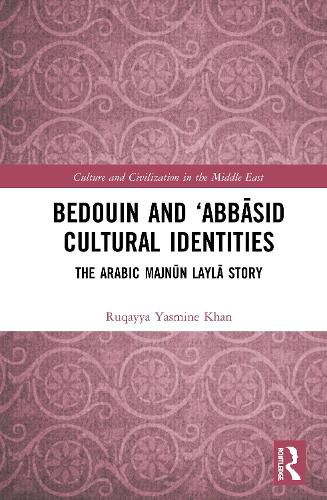Readings Newsletter
Become a Readings Member to make your shopping experience even easier.
Sign in or sign up for free!






This literary-historical book draws out and sheds light upon the mechanisms of the ideological work that the Arabic Majnun Layla story performed for ‘Abbasid urbanite, imperial audiences in the wake of the disappearance of the Bedouin cosmos.
The study focuses upon the processes of primitivizing Majnun in the romance of Majnun Layla as part of the paradigm shift that occurred in the 'Abbasid empire after the Greco-Arabian intellectual revolution. Moreover, this book demonstrates how gender and sexuality are employed in the processes of primitivizing Majnun. As markers of strangeness and foreignness in the 'Abbasid interrogations of the multiple categories of ethnicity, culture, identity, religion and language present in their cosmopolitan milieus. Such cultural work is performed through the ideological uses of alterity given its mechanisms of distancing (e.g., temporal and spatial) and nearness (e.g., affective). Lastly, the Majnun Layla love story demonstrates, in its text and reception, that a Greco-Arabian and Greco-Persian subculture thrived in the centers of 'Abbasid Baghdad that molded and shaped the ways in which this love story was compiled, received and performed.
Offering a corrective to the prevailing views expressed in Western scholarly writings on the Greco-Arabian encounter, this book is a major contribution to scholars and students interested in Islamic studies, Arabic and comparative literature, Middle East and gender studies.
$9.00 standard shipping within Australia
FREE standard shipping within Australia for orders over $100.00
Express & International shipping calculated at checkout
This literary-historical book draws out and sheds light upon the mechanisms of the ideological work that the Arabic Majnun Layla story performed for ‘Abbasid urbanite, imperial audiences in the wake of the disappearance of the Bedouin cosmos.
The study focuses upon the processes of primitivizing Majnun in the romance of Majnun Layla as part of the paradigm shift that occurred in the 'Abbasid empire after the Greco-Arabian intellectual revolution. Moreover, this book demonstrates how gender and sexuality are employed in the processes of primitivizing Majnun. As markers of strangeness and foreignness in the 'Abbasid interrogations of the multiple categories of ethnicity, culture, identity, religion and language present in their cosmopolitan milieus. Such cultural work is performed through the ideological uses of alterity given its mechanisms of distancing (e.g., temporal and spatial) and nearness (e.g., affective). Lastly, the Majnun Layla love story demonstrates, in its text and reception, that a Greco-Arabian and Greco-Persian subculture thrived in the centers of 'Abbasid Baghdad that molded and shaped the ways in which this love story was compiled, received and performed.
Offering a corrective to the prevailing views expressed in Western scholarly writings on the Greco-Arabian encounter, this book is a major contribution to scholars and students interested in Islamic studies, Arabic and comparative literature, Middle East and gender studies.